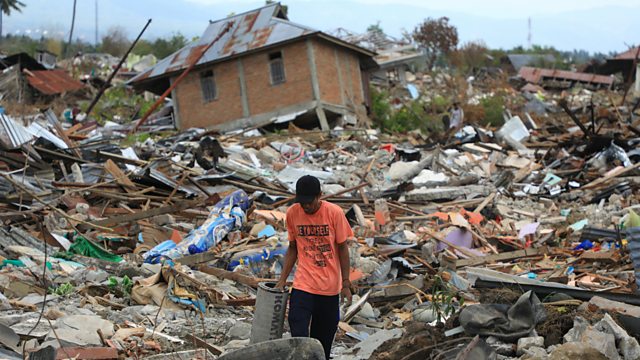
Why Speed Matters in Earthquakes
Why Speed Matters in Earthquakes
Last September’s earthquake in Indonesia hit the Sulawesi city Palu and caused a tsunami – yet conventional analysis suggests it simply wasn’t powerful enough to cause the damage it did. A new analysis shows that the quake was fast, about 4 times the speed of sound and unusually wasn’t slowed down by the objects in its way. The narrow shape of the Palu bay also contributed to the tsunami, amplifying its effects.
Researchers in France and Australia have taught honey bees to do simple addition and subtraction. Bees seem to be capable of a number of mathematical feats, the researchers think such abilities might help them negotiate their environment, e.g. the best nectar is past the 3rd tree on the left.
More than half the daily food input of all people on the planet comes from just 4 crop species. All of these are affected by pests. It’s a particular issue for places where food is in short supply and people rely on imported food. Attempts to scale up local production are accompanied by a huge growth in local pest species. And in places with food surpluses, there is a lack of focus on targeting pests.
Temperature regulating clothes. US researchers have invented a new kind of material which adjusts to the temperature requirements of the user, fibres within the cloth can tighten to increase warmth ore loosen to allow cooling and evaporation. The system works automatically.
It’s the sort of plot you would expect from a classic sci-fi movie; what if there are viruses trapped deep in Antarctic ice that could wreak havoc on humans? Alex Lathbridge puts on warm gloves and meets the scientists venturing into the icy wilds. He wants to answer listener Tony’s question - can viral life exist in such inhospitable climes and if so, might it pose us a danger?
Alex meets teams who venture to the Antarctic to find out about how their work to understand climate change leads them to drilling and analysing ice cores that are tens of thousands of years old. He then visits a dynamic husband and wife duo in France who are extracting viruses from 30,000 year old Siberian permafrost and bringing them back to life. He discovers that - rather than killing us all, - their findings of novel giant viruses might contribute to medicine and our understanding of evolution.
(Image: Aftermath of the Indonesia quake-tsunami in Palu. Credit: Getty Images)
Last on
More episodes
Broadcasts
- Sun 10 Feb 2019 15:06GMT���˿��� World Service Americas and the Caribbean
- Sun 10 Feb 2019 16:06GMT���˿��� World Service News Internet
Podcast
-
![]()
Unexpected Elements
The news you know, the science you don't

